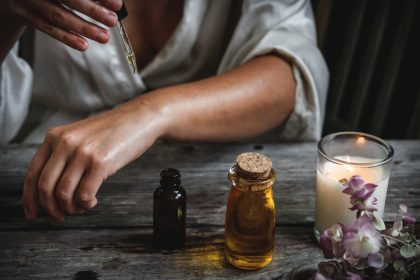How do we manage our health during autumn whilst admiring its exquisite qualities? This beautiful season arrives with its dazzling array of colours of flaming red, shiny gold, burnt orange and burnished copper. The spectacular sun dances through the trees, illuminating the leaves that still remain, their stunning hues lifting the spirits, and increasing wellbeing. However, the sharp chill in the air is a reminder that winter is on its way, and we need to be mindful of our health.

Vata season
Autumn is Vata season, when Prana, the vital breath, and life essence, is abundant in the atmosphere. This time of year is typically dry, rough, windy, cold, mobile and erratic- the characteristics of Vata Dosha. During this season, it’s important to be aware that balancing the nature of the climate with lifestyle and nutritional adjustments is key. This is to ensure we do not succumb to any seasonal health imbalances. When it comes to nourishment, we should favour warming, grounding foods which introduce the opposite qualities of Vata to the body. Some great choices are high protein meals, warming spices, as well as sweet, sour and salty tastes. Mushy, soft stews and soups, and healthy oils and fats, will all further ensure that Vata is kept in check.
Be sensible in autumn
During autumn it is not advisable to attempt any kind of fasting or dieting. It is also best to avoid raw, cold or frozen food and to keep bitter, pungent and astringent tastes to the minimum. These tastes all have the qualities of Vata. Like increases like, and these foods could easily cause the Vata principle to increase, and potentially affect our health, especially if we are already Vata dominant.
Keep chaos at bay
When it comes to lifestyle, it is important to create routine during this time of year. We should try to avoid anything erratic and chaotic (that includes chaotic people!). It’s crucial to go to bed around the same time each day, ideally by 10pm (the occasional variation is fine), and similarly, wake early, by 6am. We should take our meals in a timely manner too, thus creating a calming effect on our nervous system. Rushing around, skipping meals, and being constantly pushed for time will all vitiate the Vata principle. Our relationships and our conversations should be kind, compassionate and grounding, because when Vata is out of balance in our minds, we can become distracted, confused, nervous and irritable.

Anoint with Oil
Autumn exercise: It is best to opt for gentle exercise during autumn; perhaps some yoga or pilates, or a brisk walk in the park. Avoid anything too rigorous, again to help to keep Vata in balance. As Vata is related to all movement, anything excessive will likely cause issues.
Abyhanga (self -massage) :
Sesame oil (tila taila) is the queen of oils in Ayurveda and has been reportedly used for thousands of years. It is the oil of choice for body massage, known as abhyanga, due to its amazing properties and its Vata-pacifying nature. It is rich in linoleic acid (omega 6), it’s also anti- bacterial, anti -inflammatory and antioxidant. This healing oil reduces nervous tension, and improves blood circulation. Sesame oil seeps deep into the tissues, offering soft, unctuous goodness to our whole being, whilst opening the heart chakra, which is responsible for self love and compassion for others. Traditionally, abhyanga is given by trained therapists, and is part of the process of healing many imbalances, but this self massage is just as effective in modern life. Try to do abhyanga as often as possible, especially during the cold months.
Method:
Heat a small bottle of sesame oil by half immersing it in a bowl of recently boiled water for a couple of minutes.
Stand comfortably in your shower room, and pour the equivalent of a couple of teaspoons of the oil into your hand, then rub it between the palms. Begin massaging your neck, shoulders and upper chest area, then your arms. Next, concentrate on the abdomen, as much of your back as possible, the buttocks and thighs, before slowly working your way down your body. Take more oil as needed; don’t forget the front of the feet, in between and around the toes. However, don’t massage the soles of your feet during this ritual, as you might slip in the shower. Relax and breathe deeply and slowly for a couple of minutes before showering. Try and use only a little shower gel to wash, so you don’t wash away the lovely benefits of the oil. Your skin will be smooth, warm and supple afterwards, but more importantly, you will feel invigorated, yet calm due to the release of endorphins. Once ready for bed, you can massage the soles of your feet too. Take a little more warm oil, and rub it into the soles one by one, paying attention to any tight, achy areas. Next, make a fist with your left hand and knead the right sole, and do the left sole with the right hand. This is tension- relieving, and also gives our often neglected, overworked feet, some TLC.
We are so fortunate in the UK to be able to experience the seasons. Although we all have a preferred one, we should nevertheless appreciate that there is beauty in all of them, whilst being mindful of how their qualities can affect our health and wellbeing. Ayurveda teaches us all to fit in with the rhythms of the universe.
